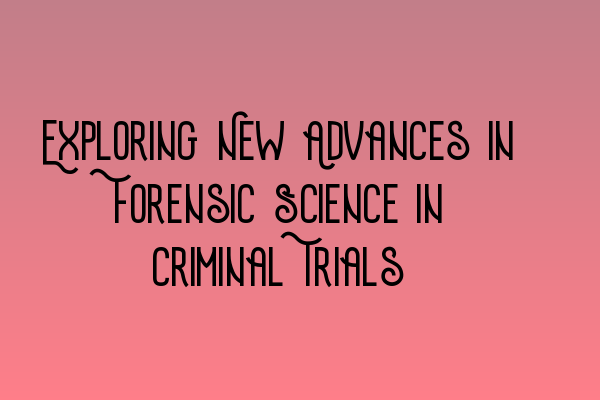Exploring New Advances in Forensic Science in Criminal Trials
In recent years, the field of forensic science has witnessed tremendous advancements, revolutionizing the way criminal trials are conducted. These new technologies and techniques have not only improved the effectiveness and accuracy of evidence analysis, but they have also empowered legal professionals to present more compelling arguments in the courtroom.
One of the key breakthroughs in forensic science is the development of DNA analysis methods. DNA profiling, also known as genetic fingerprinting, allows investigators to identify individuals based on their unique genetic code. This technique has proven crucial in solving cold cases, exonerating wrongly convicted individuals, and establishing irrefutable links between suspects and crime scenes.
In addition to DNA analysis, forensic scientists have also embraced advanced technologies, such as digital forensics. With the proliferation of electronic devices and the increasing reliance on digital evidence, digital forensics plays a pivotal role in modern criminal investigations. It involves the recovery and analysis of data from various electronic devices, such as computers, smartphones, and even Internet of Things (IoT) devices. The insights obtained from digital forensics can provide invaluable evidence to support or challenge a case.
Moreover, forensic entomology, the study of insects in criminal investigations, has gained recognition as a valuable tool for determining time of death and aiding in the identification of decomposed human remains. By analyzing the life cycle of insects found on a corpse, forensic entomologists can estimate the postmortem interval with remarkable precision. This information can be crucial in establishing timelines and identifying potential suspects.
The Importance of Staying Updated
As a criminal law professional, staying updated with the latest advances in forensic science is essential. These advancements have the potential to not only impact the way you approach cases but also to enhance your ability to provide the best defense or prosecution possible.
To ensure you are up to date, it is recommended to regularly engage in continuing professional development (CPD) activities, attend relevant conferences and seminars, and pursue specialized training programs. Companies like SQE Criminal Law & Practice Law UK offer comprehensive SQE preparation courses that cover the latest advancements in forensic science, ensuring you are well-equipped to navigate the evolving landscape of criminal trials.
Additionally, utilizing SQE 1 practice exam questions and SQE 1 practice mocks FLK1 FLK2 can help you assess your understanding of forensic science concepts and integrate them into your legal practice effectively. By engaging with these resources, you can enhance your knowledge and skills, elevating your ability to conduct thorough and persuasive legal arguments.
The Future of Forensic Science
As technology continues to advance at a rapid pace, the future of forensic science holds even greater promise. Areas such as artificial intelligence (AI) and machine learning are poised to revolutionize evidence analysis, allowing for faster and more accurate results.
For example, AI algorithms can analyze large volumes of surveillance footage in a fraction of the time it would take a human operator. This not only speeds up investigations but also reduces the risk of human error. Machine learning algorithms can also assist in the identification and matching of fingerprints, making the process more efficient and accurate.
However, it is essential to approach these advancements with a critical eye. While technology can greatly enhance forensic science, it is vital to remember that it is a tool and not a replacement for the expertise and judgment of legal professionals. Maintaining a balance between embracing new technologies and upholding fundamental legal principles is crucial for ensuring justice is served.
Conclusion
The field of forensic science is continuously evolving, providing criminal law professionals with powerful tools to navigate the complexities of criminal trials. Staying up to date with the latest advances in DNA analysis, digital forensics, and other forensic disciplines is essential for any legal practitioner.
Companies like SQE Criminal Law & Practice Law UK offer comprehensive preparation courses that cover the latest developments in forensic science, enabling legal professionals to navigate this ever-changing landscape confidently.
By integrating resources such as SQE 1 preparation courses and SRA SQE exam dates into your professional development plan, you can ensure you are equipped to provide the best possible legal representation to your clients.
Remember, staying informed and embracing new advances in forensic science will not only enhance your professional capabilities but also contribute to the pursuit of justice.
